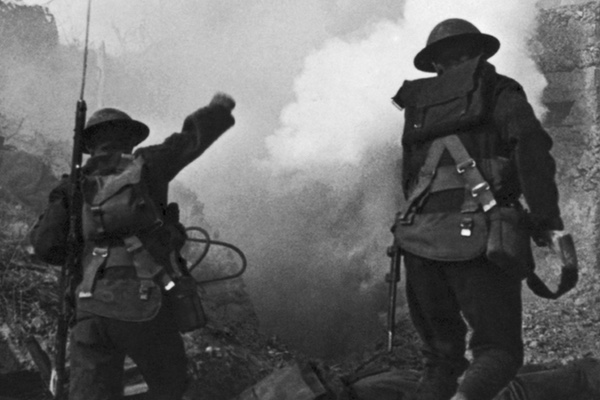Have You Ever Heard of the British-American War Over Oregon in 1846?

Just
eight days before the November 11, 1918 Armistice ending World War I
my great uncle, Ira Pitzer, was killed during battle in France. His
mother was overcome with grief for the rest of her life, a tragedy
shared by so many families who have served in the
military.
Veteran's Day is to honor the service and
sacrifice of the men and women in the armed forces. But Veteran’s
Day should also mean something more, an inspiration to win a lasting
peace.
As
President Dwight Eisenhower once proclaimed on Veteran's Day, "Let
us reconsecrate ourselves to the task of promoting an enduring peace
so that their efforts shall not have been in vain."
As
a nation we must be committed to ending wars. We owe that to those
who have fought to stop aggression overseas and given us a chance to
build peace, freedom and prosperity.
Imagine being
a soldier in the First World War as the Armistice arrived. Surely the
world would come to its senses after a slaughter that claimed tens of
millions of lives.
As hard as those soldiers fought
during World War I, they deserved a lasting peace. But yet within two
decades there was World War II, with even more destructive weapons.
Since that time there have been many regional conflicts.
The
aftermath of World War I is referred to as the Lost Peace for that
reason. But we should never give up on that dream of a world without
war. We must strive for peace.
Resolving conflicts
requires U.S. diplomatic power. We must deploy more peacemakers
everywhere there is the threat of violence. War is not always
inevitable.
Have you ever heard of the British-American
war over Oregon in 1846? Exactly, because it never happened.
Diplomacy and peacemakers prevailed instead of taking up arms.
An
American diplomat named Albert Gallatin wrote peaceful letters that
were read in Britain. Gallatin helped calm U.S.-British relations at
a time of great tension over which nation owned the Oregon Territory.
Preparations were made for war. Instead the Oregon Treaty of 1846
resolved those boundary issues without fighting.
The
Cuban Missile Crisis of 1962 brought the U.S. and Soviet Union to the
brink of nuclear war. Diplomacy led by President Kennedy prevented
the ultimate disaster. Within a year the two nations took some steps
away from war with the establishment of a hotline for communication
and a treaty limiting nuclear testing.
This is an
important lesson for us today while the risk of war with
nuclear-armed North Korea remains high. Diplomacy is imperative in
the age of nuclear weapons. As President Ronald Reagan once said "A
nuclear war cannot be won and must never be fought."
Another
lesson in peace building comes from Captain Thomas Orbison of the
U.S. Army, who was assigned to relief in Latvia after World War I.
War always results in food shortages and hunger for the affected
nations. Orbison, a doctor, had this noble idea called "the
gospel of food for undernourished children." His commanding
officer, Colonel John C. Groome, had one reply: “Go to
it.”
Orbison and his fellow officers set up feeding
programs for children in Latvia, a country which was ravaged by
fighting after the Armistice. Captain Orbison wrote "One cannot
describe the wealth of love, joy and satisfaction that flowed from
those rag-clad women and children as they sat at the tables and ate
their first satisfying and nourishing meal in a long, long time. The
tears that were shed, the smiles through the tears, the silent look
of real adoration on every face — one never forgets such an
experience."
We should never forget the hungry
children around the world, many of whom are in war zones. We should
support infant feeding and school lunch programs to help these
children recover. We cannot build a peaceful world if children are
malnourished.
We could prevent many future conflicts if
we eliminated hunger and gave nations that essential foundation for
stability. Fighting hunger was a component of our Post World War II
peace strategy, which the U.S. army was a major part.
As
Eisenhower once said, "How can we expect children who are
reduced almost to an animal-like level of existence, struggling each
day for any kind of scrap that will keep them alive, how can we
expect them to develop the ideas and the ideals that in the future
will bring them to be apostles of peace?"
We need
as many apostles of peace in this world today to prevent future wars.
So there may come a day when soldiers do not have to deploy to lands
far away that are in chaos.
On this Veteran’s Day to
honor our nation’s military service members, let’s also commit
ourselves to winning a lasting peace and bringing about an end to
war.